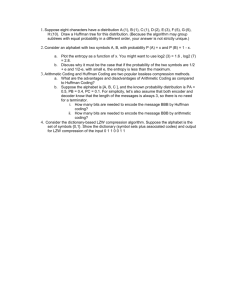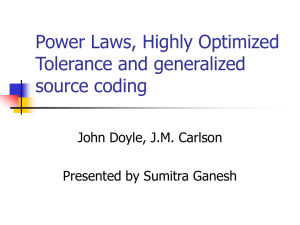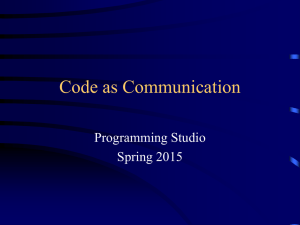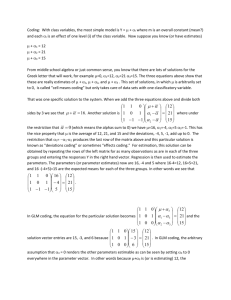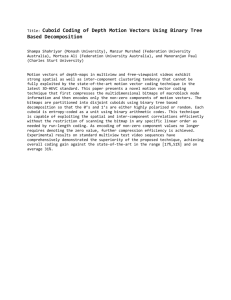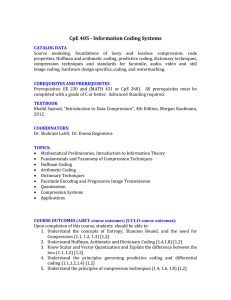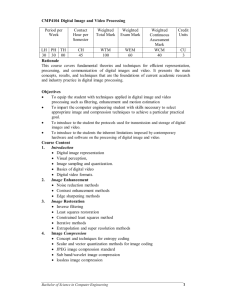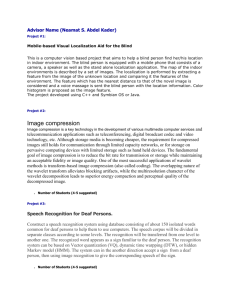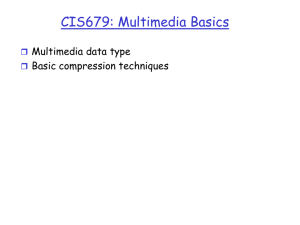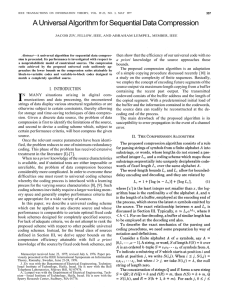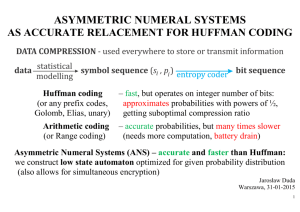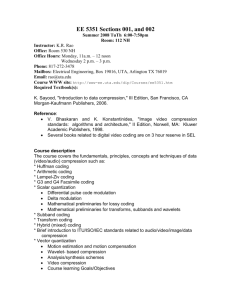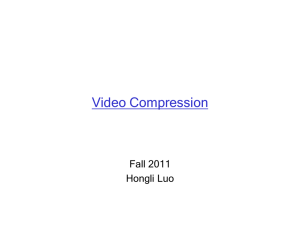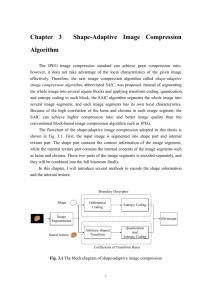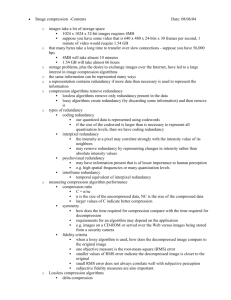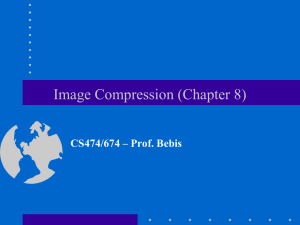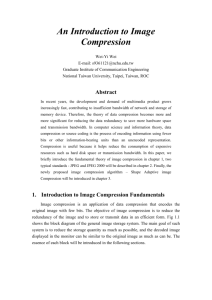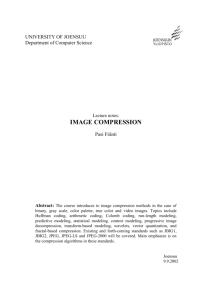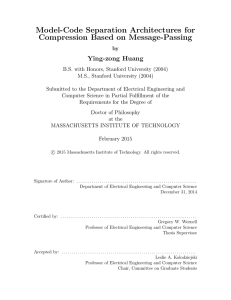Course Syllabus
advertisement
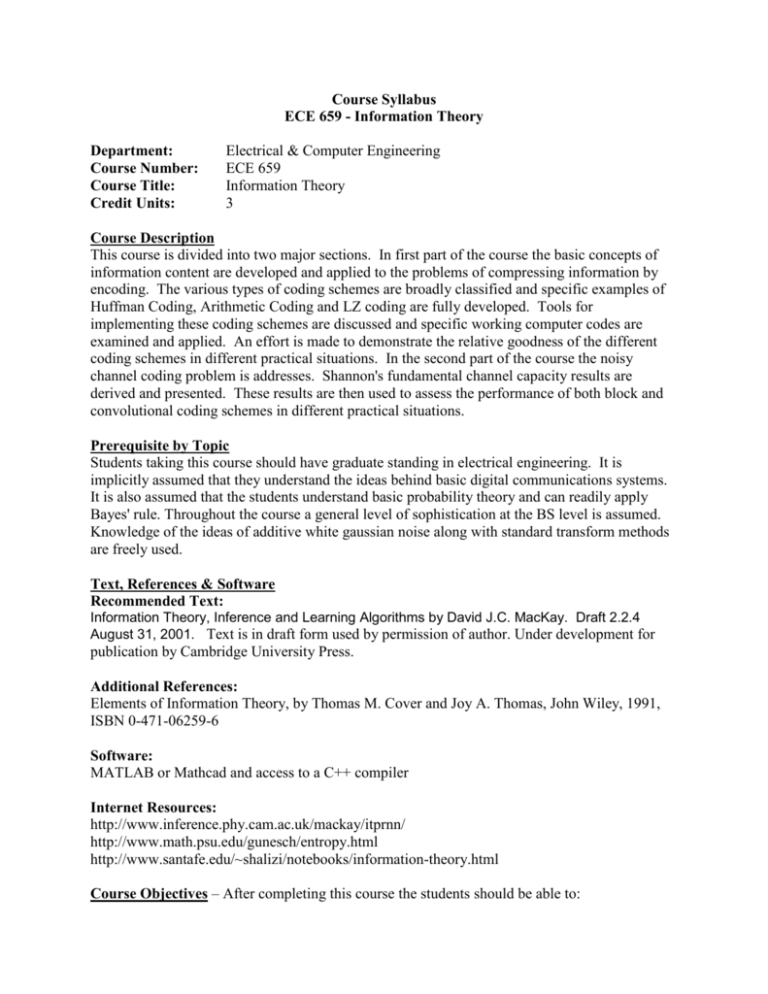
Course Syllabus ECE 659 - Information Theory Department: Course Number: Course Title: Credit Units: Electrical & Computer Engineering ECE 659 Information Theory 3 Course Description This course is divided into two major sections. In first part of the course the basic concepts of information content are developed and applied to the problems of compressing information by encoding. The various types of coding schemes are broadly classified and specific examples of Huffman Coding, Arithmetic Coding and LZ coding are fully developed. Tools for implementing these coding schemes are discussed and specific working computer codes are examined and applied. An effort is made to demonstrate the relative goodness of the different coding schemes in different practical situations. In the second part of the course the noisy channel coding problem is addresses. Shannon's fundamental channel capacity results are derived and presented. These results are then used to assess the performance of both block and convolutional coding schemes in different practical situations. Prerequisite by Topic Students taking this course should have graduate standing in electrical engineering. It is implicitly assumed that they understand the ideas behind basic digital communications systems. It is also assumed that the students understand basic probability theory and can readily apply Bayes' rule. Throughout the course a general level of sophistication at the BS level is assumed. Knowledge of the ideas of additive white gaussian noise along with standard transform methods are freely used. Text, References & Software Recommended Text: Information Theory, Inference and Learning Algorithms by David J.C. MacKay. Draft 2.2.4 August 31, 2001. Text is in draft form used by permission of author. Under development for publication by Cambridge University Press. Additional References: Elements of Information Theory, by Thomas M. Cover and Joy A. Thomas, John Wiley, 1991, ISBN 0-471-06259-6 Software: MATLAB or Mathcad and access to a C++ compiler Internet Resources: http://www.inference.phy.cam.ac.uk/mackay/itprnn/ http://www.math.psu.edu/gunesch/entropy.html http://www.santafe.edu/~shalizi/notebooks/information-theory.html Course Objectives – After completing this course the students should be able to: 1. 2. 3. 4. 5. 6. 5. 6. 7. 8. 9. Understand the basic classes of compression techniques Be able to determine to best class of compression techniques to use in a particular situation. Know how to apply compression techniques to practical situations. Understand the ideas of entropy and information content. Be able to apply these ideas to showing the limits of compression in any situation Master the basic ideas behind the Shannon Channel Capacity results Be able to assess the limitations for data transmission on a given channel Understand how different coding techniques will perform in different situations Be able to know which channel coding techniques types to use is different situations Be able to assess the potential of new and unique channel coding methods Understand the current state of the are for both data compression and channel coding Topics Covered/Course Outline 1. Review basic concepts of probability including Bayesian analysis 2. Introduction to entropy and information content 3. General theory of data compressions 4. Overview of specific data compression techniques 5. Channel capacity theory 6. Evaluation of different coding techniques in specific situations 7. State of the art Turbo Codes Relationship to Program Outcomes This supports the achievement of the following outcomes: a) Ability to apply knowledge of advanced principles to the analysis of electrical and computer engineering problems. b) Ability to apply knowledge of advanced techniques to the design of electrical and computer engineering systems. c) Ability to apply the appropriate industry practices, emerging technologies, state-ofthe-art design techniques, software tools, and research methods of solving electrical and computer engineering problems. d) N/A e) N/A f) Ability to maintain life-long learning and continue to be motivated to learn new subject. g) Ability to learn new subjects that are required to solve problems in industry without Being dependent on a classroom environment. h) Ability to be competitive in the engineering job market or be admitted to an excellent Ph. D. program. Prepared by: David Schwartz October 24, 2002

